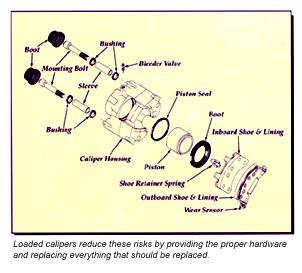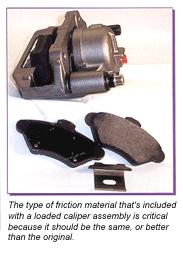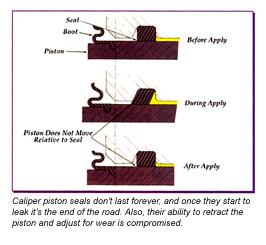Advertisement [ ? ]
Site Links
- Lease Calculator
- Advertise
- My Car ongoing Review
- Members' Chat
- Cars For Sale
- Car Dealers
- Honda "Fit" Manual
- Hyperflex Bushings
- For Sale
- Fix your Car
- Car Manuals
- other manuals - Reference Materials
- DIY Repairs
- Articles
- Video
- Link with Us
- Search Help
- Code your Mac!
- Fly, race, anything R/C
Loaded Brake Calipers
How popular are loaded brake calipers? According to one brake supplier we interviewed for this piece, loaded calipers are much more popular with technicians on the West Coast of the U.S. than on the East Coast. The reason? West coast technicians like loaded calipers because everything they need comes in one box, they don't have to worry about mismatched parts from different suppliers, the complete assemblies are quick and easy to install, and they see fewer comebacks because of brake noise or other problems. East coast technicians also like loaded calipers for the same reasons, but do business in a market that is much more sensitive to price. Consequently, the Easterners typically reuse more parts and replace calipers only when necessary.
Regardless of where you live, loaded calipers do provide a variety of benefits when doing a brake job. Most brake suppliers have a loaded caliper program today so availability is seldom an issue.

One of the main advantages of installing loaded caliper assemblies when you do a brake job on your car or truck is that they restore the brakes to like-new condition. Not only do they include new friction, but also a professionally rebuilt caliper and properly matched hardware (shims, bushings, slides, etc.). This significantly reduces the risk of future leaks developing, and uneven braking or pad wear caused by calipers hanging up or dragging.
Replacing Brake Calipers
Caliper piston seals don't last forever, and once they start to leak it's the end of the road for the caliper and the pads. Fluid leaks are dangerous because they can lead to a loss of hydraulic pressure in the brake circuit that may cause the brakes to fail. Brake fluid leaking from a caliper can also contaminate the brake linings and cause them to grab or pull.
A caliper may also have to be replaced if it is sticking. Internal corrosion can cause pistons to jam or freeze preventing the caliper from working normally or releasing completely. External corrosion on the caliper mounts, bushings or slides can cause problems too by prevent a floating caliper from moving normally when the brakes are applied. The result here may be uneven pad wear, uneven braking, dragging or a pull. With a loaded caliper, the caliper is replaced along with the pads.
Many technicians and do-it-yourselfers have learned the hard way that attempting to rebuild old calipers is often a waste of time. In many instances, the old calipers are so badly corroded or worn they can't be rebuilt, or they leak when they are put back on the vehicle. Disassembling a caliper to replace the piston seal and dust boot is a messy job, and may be difficult or impossible if the piston is stuck in place. Steel pistons often can't be reused because they're too badly corroded, and scratches or pits in the caliper bore may cause the caliper to leak even after a new piston and seal are installed. That's why most technicians prefer to replace old calipers with new or remanufactured calipers.

Replacing the hardware is important, too, because old corroded hardware can cause braking problems. We have heard of shims that have worked loose and caused a rotor to fail by rubbing and cutting through the rotor hat! If you forget to install an anti-rattle clip or install one that does not fit properly, the newly installed pads may be noisy. Loaded calipers reduce these risks by providing the proper hardware and replacing everything that should be replaced.
The type of friction material that is included with a loaded caliper assembly is critical because it should be the same, or better than the original. If your car was originally equipped with ceramic pads, the loaded caliper should have the same type of friction material. The same goes for semi-metallic pads.
To avoid a mismatch of friction side-to-side, when installing loaded calipers on your car or truck, both calipers should be replaced at the same time. If only one caliper is being replaced, be sure to use the same friction pads on both sides.
When a loaded caliper is installed, the brake system should always be flushed and refilled with clean, fresh fluid that meets the OEM requirements for the application (DOT 3 or 4 fluid).

Caliper slides and bushings should be lubricated with a high temperature brake lubricant, and related brake components such as hoses, lines, rear wheel cylinders and the master cylinder should all be inspected to make sure these components are in good working condition and are leak-free.
Remanufactured Brake Calipers
Everybody knows remanufactured replacement parts are usually less expensive than brand new parts, but are they as good? The answer to that question depends on who supplies the parts and how much expertise and effort they put into remanufacturing their products.
There are top quality remanufacturers who are QS-9000 certified and who turn out reman products that are just as good as many brand new parts. Their prices may be 20 to 40 percent less than a comparable new part or an OEM part, and they typically offer warranties ranging from a year up to a limited lifetime warranty.
There are also bargain-priced, low quality remanufacturers. Their prices are extremely competitive, but they may provide nothing more than a short-lived cheap fix. Warranties typically range from 30 days to 90 days at most. These kind of parts might be OK for if you are on a very limited budget or will be selling or trading your car soon. But these "second line" reman parts may be no bargain if you plan on keeping your car for long.
When you fix your brakes, you want the brakes to stay fixed. Replacement parts don't necessarily have to last as long as the original equipment parts to provide good value. Most OEM parts today are engineered to last up to 150,000 miles. Often they do, but sometimes they do not. The point is reman brake calipers do not have to provide the same durability as OEM parts because most vehicles that are six to 10 years old probably don't have another six or 10 years left in them. Consequently, a reman replacement part that is engineered to go another 50,000 to 75,000 miles will probably last long enough for most people.
The bottom line is go with a brand name supplier, and choose brake calipers that provide the best warranty.
WARNING: DO NOT USE OIL, GREASE, ANTI-SEIZE OR LUBRICANTS OF ANY KIND WHEN TIGHTENING LUG NUTS!
Proper torque on lug nuts is very important for three reasons. One is to keep the lug nuts from loosening up and the wheel coming loose, another is to prevent distortion of the brake rotor behind the wheel, and a third is to prevent broken studs. A torque wrench should be used for final tightening of the lug nuts, and the nuts should always be torqued to the recommended specifications.
CAUTION: Torque specifications for lug nuts are always for CLEAN and DRY studs and lug nuts. That means no oil, no grease, no anti-seize and no lubricants of any kind. Any of these products will reduce the friction between the threads. This may seem like a good thing to prevent rust and frozen lug nuts, but the reduction in friction means a much higher percentage of the applied torque (up to 25% or more) will go toward loading the lug nuts. The end result may be brake rotor distortion or broken studs!
Wheel studs should be cleaned with a wire brush to remove rust and dirt BEFORE the wheels are mounted. If the lug nuts are heavily rusted or have damaged threads and won't turn easily on the studs, replace the lug nuts. The same goes for any wheel studs with damaged or badly corroded threads. And remember to mount the wheels DRY with nothing on the threads.
Adapted from an article written by Larry Carley for Brake & Front End magazine
Back to Brake | Back to Info Main Page
Total messages: 0
